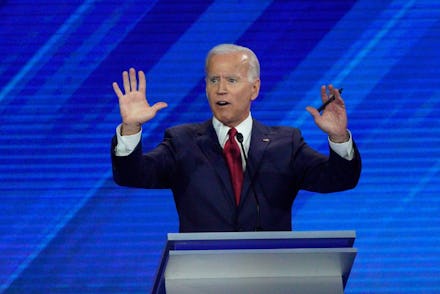Unpacking Joe Biden's baffling response to the question of reparations

All 10 of the candidates who took the stage Thursday in Houston for the third Democratic debate had to fight to get there. Some, like Minnesota Sen. Amy Klobuchar and former Housing and Urban Development Secretary Julián Castro, had barely scraped together the polling strength to appear, while others like frontrunner Joe Biden, the former vice president, battled persistent attacks on his record by candidates looking to take the top dog down a peg.
But some of Biden's worst wounds have been self-inflicted — and on Thursday night, he added another one. Asked directly by ABC News moderator Linsey Davis on his stance on reparations, Biden offered a muddled answer that was not only confusing but, to some viewers, also insulting to Black parents by insinuating they don't know how to properly care for their children.
Biden does not outwardly support reparations to address the racial inequality resulting from slavery's repercussions, and as a senator in the 1970s he said outright that "I'll be damned if I feel responsible to pay for something that happened 300 years ago." When confronted with this quote directly by Davis, Biden skirted, giving a straight answer on the question of reparations and instead laid out broad strokes from his education plan.
The problem, though, is that Davis' question asked how to "repair the legacy of slavery," and while Biden never mentioned Black families directly, he seemed to be clearly talking about them. And what he said wasn't good.
Invoking his plans to raise teacher wages, Biden spoke about the hardships such educators face. We must "make sure that we bring in [resources] to help the teachers deal with the problems that come from home," Biden said, claiming there is currently just one school psychologist for every 1,500 students. After mentioning his plan to develop a universal preschool program, he then suggested social workers should visit homes of parents to "help them deal with how to raise their children. It's not that they don't want to help. They don't know quite what to do."
As Vox points out, the home-visit plan is actually an extension of the Affordable Care Act that Biden has proposed to fill out his education agenda. The programs have been shown to have some success, albeit in a limited capacity, per Vox.
But as the ending of his answer to a question ostensibly about reparations for Black families affected by slavery, it was "a sermon implying that Black parents don't know how to raise their own children," said Time editor Anand Giridharadas. Coupled with Biden's scoff when Davis began her question by telling the candidate she wanted to ask him about "inequality in schools, and race," the response raised a few questions about Biden's sensitivity to race relations.
Nikole Hannah-Jones of The New York Times Magazine also singled out Biden's rambling response, saying that the candidate worded his answer "as if Black is synonymous with poverty/dysfunction":
To cap things off, Biden repeated a dubious claim that children from poor families end up hearing millions fewer words than other kids, putting them at an educational disadvantage. To solve the problem, he suggested parents "make sure you have the record player on at night" — a note that attracted derision all on its own.